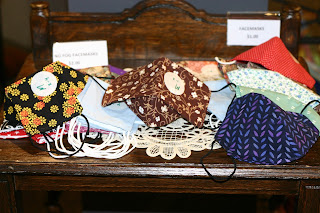 |
| Masks available for purchase in Whitby Gift Shop, taken by Sister Moira Wild |
It’s been a week of “too-muchness” of some things: positive cases of COVID; who will win the election...and how; concern about what the near future, much less the distant future, will bring; when we will be back to normal or on to new challenges; restlessness and fatigue while getting nothing done; fighting among siblings; more and more masks to hide smiles and muffle laughter.
It has also been a week of “too-littleness”: too little energy; too little time to just “stand and stare” or sit and watch it snow; too little time to gently listen and converse, much too little time and willingness to admit or grieve loss, death, isolation, lack of touch, hugs, tender glances or anything other than kisses in the air as the kids get on the school bus every other day or a spouse ventures off into the big world of business—would it be safe and kind?
We wonder whether big business will survive the stacks of unsold Halloween costumes this year—from father down to the puppy! Or what if, in the traditional Thanksgiving gathering, we have to uninvite some? What will we be grateful for this year? “Over the river and through the woods” will but linger in our memories; my roasted apple and fresh cranberry salad recipe for 15 will need to be pared down to only 6...if that!
Oh, dear, I tell myself I need to do something positive! So, I decide to empty my waste basket! Now, what is this? A Payday candy wrapper, a newspaper from which I saved of a Jeff Keane’s “Family Circus” to send to a friend, some reworked poetry I had forgotten about, and too many envelopes begging for money usually to feed the babies lying listlessly on their mother’s breast or the beggar wheeling his cart down the hill where he’ll sleep for the night. To which of these will I send my next Payday candy bar? It’s so little for this “too-muchness” day!
Renée Domeier, OSB







